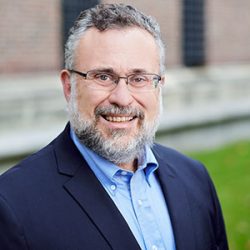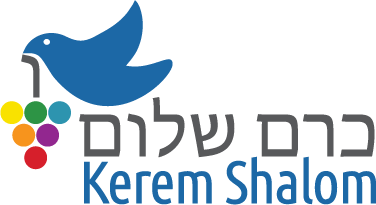October 2025

Shana Tova!
Rabbi Darby and Molly—thank you for leading us in such meaningful services. Thank you as well to Robyn, other staff members, and the many dedicated volunteers whose hard work makes it possible for us to have these services.
Some of you may remember that when I stood here last year, I asked “why are you here?”
This year my question is: “why are we here at Kerem Shalom?”
I’m not trying to be cute. Rather, as Rabbi Darby has taught us, the High Holy Days, like much of Judaism are both an individual and a collective experience.
So just as the High Holy Days are a time to make an honest assessment of ourselves as individuals, they also are a time for us to make an honest assessment of ourselves as a community.
While this is is something we should do every year, it’s particularly important right now because, as you all know, this has been a challenging year—not only globally and nationally but also locally and within the KS community.
I believe that many of you are here, at least in part, because you want to be part of what our website calls a “vibrant, inclusive, welcoming, and progressive” Jewish community.
But what does that mean in practice?
Should Kerem Shalom, as a Jewish religious institution, be doing more – and if so what should, be doing about a wide variety of disturbing events, including:
• The deeply troubling situation in Israel, Gaza and the West Bank?
• The current crackdown on immigrants?
• The growing number of people in our own region who don’t have enough to eat?
• The troubling rise in antisemitic incidents right here in Concord?
• The growing use of antisemitism to justify actions taken against universities and other important institutions?
• And much, much, more including attacks on free speech, the dismantling of key institutions, and the rollback of efforts to address our long history of racial discrimination.
In the Jewish tradition of asking questions that further complicate matters, let me also ask
• How much should Kerem Shalom focus on social action and how much should we focus on other activities that are just as central to our identity as a Jewish community, notably
• Offering spiritually meaningful services,
• Providing engaging educational opportunities for both children and adults
• Building community and being there for each other, particularly during hard times
• Making sure our own house is in order
Kerem Shalom’s lay leaders and professional staff have tried to answer these questions in ways that reflect our values, our priorities, our capacity, and the immediacy of each particular challenge. But I’m sure many of you feel that we haven’t done enough about something important and/or that we did too much or, perhaps, that we did the wrong thing.
I accept and embrace that reality. But it also concerns me.
I fear that as our individual concerns about current problems increase, our tolerance for (and acceptance of) those who disagree with us will decrease. If that happens, we will become weaker as a community at the exact moment when we need to be stronger.
Of course, Jews have wrestled with some versions of these questions for centuries and they often did so in the face of dire threats to their lives and communities.
Even in those circumstances, they drew on Judaism to find strength, comfort, and, amazingly, moments of joy and light. Moreover, they also made sure that their children learned what it meant to be Jewish – knowledge that, if they survived, would help them respond to the challenges they would face as adults.
Now I don’t believe we are at a point as dire as what those ancestors faced. But I do believe we are at an especially fraught moment. And I also believe that Jewish teachings and experiences, as expressed and interpreted at Kerem Shalom, can help us find our way in these challenging times.
In that spirit and in the spirit of the High Holy Days, I ask your forgiveness for any of the ways I as an individual, we as an institution, or we as a community may have hurt you or let you down in the last year. If that’s the case, please come find me so we can try to make things right and put unresolved issues to rest.
And, again in the spirit of the High Holy Days let me also share some aspirations I have for the community in the coming year.
• I hope we will hold (and you will join others at) services that reconnect us with whatever we believe is divine and holy
• I hope that we will provide (and you will take advantage of) stimulating opportunities for people of all ages to learn what Judaism can teach us about how to live more fulfilling lives, including how to respond to challenging times
• I hope that we will offer (and you will participate in) meaningful opportunities to come together to do Tikkun Olam
• I hope that we will provide (and you’ll take advantage of) opportunities to make connections and build community. I also hope you’ll respond when we need to comfort those who are grieving and help those who are ailing.
• And finally, I hope each of you will take advantage of opportunities to be good stewards of this community.
As we do all of this, I’m sure that— at least at times – we will disagree on how exactly to respond to specific significant challenges. When that happens, let’s strive to do so in open-minded, respectful, and loving ways. And when we “miss the mark”—and we will “miss the mark” —I hope we’ll seek ways to reconcile and forgive each other.
These practices won’t fix everything that needs to be fixed. But in addition to nudging ourselves and the world in the right direction, they can give us the strength we need to persevere, and help us share badly needed opportunities for joy, light, and connections.
I know this is a tall order for the coming year. But tall orders, it seems to me, are what the High Holy Days are all about. Moreover, I believe, it’s what we need—both as individuals and as a community—at this critical point in time.
In the year ahead, I hope you’ll join me and others in the Kerem Shalom community on that journey.
Shana Tova.
